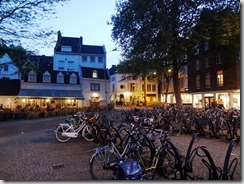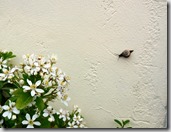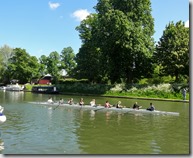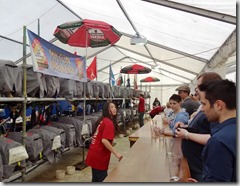The headphones are off as the last call ends; I’ve pushed back from the table and started to think about the weekend. The sun is shining across the Maas into unsettled skies, and the streets are filling with people looking for a bite and a biertje.
It’s been a good day.
I read an article today that asked, rhetorically, What is the second most useful language?  Globalists would make the case for Chinese or Arabic, romanticists might prefer French or Japanese. But for most people, “None” is the right answer: if you speak English, you don’t need anything else.
Globalists would make the case for Chinese or Arabic, romanticists might prefer French or Japanese. But for most people, “None” is the right answer: if you speak English, you don’t need anything else.
The author argues that the right answer is “Any language”. So that you know what your colleagues, fellow conference delegates and negotiators are going through, how tiring their working days are and how impressive their linguistic accomplishment is.
I agree with the sentiment: the Dutch make languages look deceptively easy and I’ll speed up thoughtlessly if I’m not sensitive to their effort. Similarly, forced encounters with immigration services drives appreciation of the difficulties of the process and the bad feelings it evokes. Immersion in a liberal (or xenophobic) politics, in austere (or socialist) economies, teaches concrete lessons of human costs and benefits that no commentator conveys.
But I don’t agree with the article’s rationale. There is an intrinsic value in being able to directly appreciate how natives capture a thought or express a feeling,what words and metaphors they choose. Fluency means membership in the community, access to goods and services, awareness of what’s going on around me. Language skills are important.
 What does it take to learn a language, or cultural norms, and social skills? Gladwell’s 10,000 hours of practice? Josh Kaufman argues in The First 20 Hours that a level of proficiency can be achieved in far less time.
What does it take to learn a language, or cultural norms, and social skills? Gladwell’s 10,000 hours of practice? Josh Kaufman argues in The First 20 Hours that a level of proficiency can be achieved in far less time.
Nobody can become an expert in a few days, but the point is that you can become good enough to enjoy a new skill. It takes “Deliberate practice”: a plan and a focus. He suggests choosing a project you love; focusing your energy on just one skill at a time; making time for practice; and emphasizing quality over speed.
For my Dutch, the structure comes from a workbook or an online course: I can see real improvement when I do it regularly without distraction, and then force myself to use what I learned in public. I’m a great believer in ‘giving things a go’, in the honor of trying even when your performance isn’t very good.
Europeans don’t tend to work that way. A Dutch farmer once told me that he doesn’t ski at all because he didn’t have the time to master it. If you can’t learn it properly, don’t learn it half-way. A British neighbor told me over tea that she gave up foreign travel because going to new places without time to read up on the country and culture, without having time to spend immersed and expatriate, was just too superficial and frustrating.
It seems to me that you miss a lot of life that way.
 I went to Dutch today with a clipping to read and discuss out loud. Paulien Cornelisse writes a Friday column for NRC-Next on the peculiarities of language, and Dutch in particular. Today’s writing explored the simple, subtle word Zitten. “Do we overuse the word ‘sit’ because our culture does so much of it,” she asks, “Do Brazilians overuse ‘dance’?” I wonder.
I went to Dutch today with a clipping to read and discuss out loud. Paulien Cornelisse writes a Friday column for NRC-Next on the peculiarities of language, and Dutch in particular. Today’s writing explored the simple, subtle word Zitten. “Do we overuse the word ‘sit’ because our culture does so much of it,” she asks, “Do Brazilians overuse ‘dance’?” I wonder.
Yet its interesting how many of her apologetic examples parallel (US) English usage. Its fun to be able to debate with my Dutch teacher whether there is a difference between something that sticks to the wall (an action) and something that sits on it (a result).
And it’s good to find that the statement “Jongedame, niet aan de knopjes van het fornuis zitten!” has no blushing subtext, that iets sjieks means “something fancy”, not “something sexy”.
It’s a good weekend, therefore, to go out and read something.






































